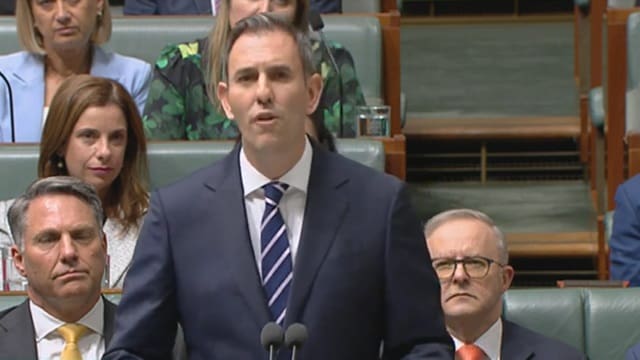
Treasurer Jim Chalmers delivers the budget tonight.
AUSTRALIA’S agricultural sector biosecurity, worker and market access will be boosted by $1.5 million of new spending in the Federal Budget tabled in parliament tonight.
But farmers, travellers and importers will pay more to underpin Australia’s first ongoing sustainable biosecurity funding model, sketched out by Minister of Agriculture Murray Watt in a media statement tonight.
A proposed increase in agricultural levies, “set at a rate equivalent to 10 per cent of the 2020-21 industry-led agricultural levies” from July 2024, is expected to raise $153 million over three years. This was criticised by National leader David Littleproud as amounting to a food tax on Australian families.
Under the proposed biosecurity funding model, the government expects larger importers to contribute $350 million to biosecurity costs next year, from an increase in fees and cost-recovery charges. Import items valued at $1000 or less will attract a new biosecurity levy, aiming to raise $81 million over three years.
Mr Watt said the model will result in more than $1 billion of additional funding for biosecurity, including $845 million to support biosecurity operations across the country, protecting the nation’s valuable agricultural industries.

Federal Minister for Agriculture Murray Watt: model will result in more than $1 billion in biosecurity funding.
“For the first time, an Australian Government is locking in higher, ongoing and more predictable biosecurity funding, from year to year – drawing a line under years of stop gap, temporary funding from Coalition Governments, that placed our agriculture sector at risk.”
Mr Watt said to address risks from travellers and parcels, funding from an increase to the Passenger Movement Charge will contribute to the cost of biosecurity, and cost recovery will be expanded to include the biosecurity clearance of parcels and non-letter mail. The charge will increase by $10 from mid-next year and apply to all passengers departing the country.
“Importers will contribute more fairly through their clearance costs with increased fees and charges expected to take their total contribution to biosecurity costs to almost $350 million next year,” Mr Watt said.
“The Albanese Government will also explore options to introduce a broader biosecurity import levy that is consistent with international trade law obligations,” he said.
“We will also introduce a modest new biosecurity protection levy on agriculture, fisheries and forestry producers – creating a new system that will be more predictable, equitable, transparent and accountable than ever before,” he said.
“We are locking in higher and more certain biosecurity funding, along with a fair system to pay for it that shares the cost equitably between taxpayers, importers, parcel senders, international travellers and producers.”
Key agriculture, forestry and fisheries measures in the Federal Budget include:
- $145.2 million upgrade to digital biosecurity services through a Simplified Targeting and Enhanced Processing System. This is a program of work to bring our cargo management systems into the modern digital age, reducing costs and delays for industry and government. This will free up biosecurity workers for other jobs and reduce congestion at the border.
- $40.6 million to continue the Indigenous Ranger Biosecurity Program in Northern Australia – a key part of frontline biosecurity monitoring, detection and response in our north.
- $302.1 million over five years to support climate-smart agriculture through the Natural Heritage Trust – helping farmers transition to a low emissions future and strengthen agricultural sustainability.
- $38.3 million for ABARES to improve the collection, analysis and sharing of data on the impact of climate change and low emission technology on agriculture, to assist policy making and farmers’ decision making.
- $127 million to the Department of Agriculture, Fisheries and Forestry – a one-off payment in 2022-23 to ensure the viability of the Department, addressing a decade of chronic mismanagement, underfunding and budgetary incompetence by the former Coalition Government.
- $5 million to develop a renewed Australian Animal Welfare Strategy – to deliver on the Government’s election commitment to update and enhance a national approach to animal welfare.
Mr Watt said funding continues for the roll out of key forestry initiatives including grants to improve innovation, a national institute of forest products innovation and plantation establishment grants. The government is also committed to continuing the rollout of country of origin seafood labelling throughout the next 12 months.
Farmers dealt ‘bittersweet hand’ on biosecurity – NFF
However, the National Farmers Federation said farmers hoping to see an increase in biosecurity funding have been dealt a “bittersweet hand”, as they face a bill equivalent to 10 percent of their industry-led agricultural levies – levies which already fund many biosecurity activities and organisations. The increase will be imposed on products from 1 July 2024, after a period of industry consultation.
“The move to have farmers foot the bill is a bitter pill to swallow.
“We’re already significant financial contributors,” NFF president Fiona Simson said.
“What’s more, we bear the cost of managing historical pest and disease incursions and face the enormous threats posed by pests and diseases on our doorstep.
“After years of consultation and discussion, we’d hoped to see a scheme such as a broad-based container levy – that forced risk creators to underwrite the system,” Ms Simson said.
“It’s extremely disappointing to have to continue waiting for a meaningful contribution from risk creators.”
NSW Farmers president Xavier Martin said at first glance, the $1 billion in extra funding to strengthen biosecurity measures sounds great
“However, it’s farmers that are being told to pay for it with a new ‘biosecurity protection levy’.
“Biosecurity is a significant threat on many levels, not just for agriculture, but for the Australian economy in general,” he said.
“It’s risk creators, the people exposing our country to deadly diseases and pests, that should be bearing the brunt of the cost, not farmers who are growing our food and fibre.
“Sure, importers will be paying slightly more but quite frankly, it’s not enough.”
Tax on farmers will hit families – Littleproud
Mr Littleproud responded tonight that the Labor government’s budget will introduce a new food tax on Australian families, in the middle of a cost-of-living crisis.
He said the new tax on farmers to pay for the biosecurity risk of international importers was senseless and would be passed onto consumers, which meant even higher grocery bills for all Australians.
“It is unfathomable the Labor government would ask farmers to pay for the biosecurity costs of importers from other countries,” Mr Littleproud said.

HAVE YOUR SAY